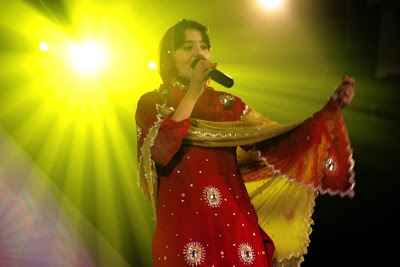
About halfway through her new documentary Afghan Star, British filmmaker Havana Marking finds an image that best expresses the confused, artificial progress of post-Taliban Afghanistan: A woman, completely covered by a burqa, snaps a photo of a wannabe pop star with her cellphone. For a movie about modern, Westernized culture attempting to flourish in a land still dominated by theocratic repression, the clash of the cellphone and the burqa is its strongest symbolic representation.
Of course, the phenomenon of modern technology infiltrating regressively backward cultures is not limited to Afghanistan; in fact, it’s led to a rise in populism and citizen journalism throughout the Middle East (recall that most of the reporting of the recent Iranian protests has come from protestors’ Tweets, and the only images we’ve seen of Saddam Hussein’s hanging were captured via private cellphone videos).
But Marking’s film shows us that, at least in the fractured world of contemporary Afghanistan, the taste of Western-style democracy in the form of an American Idol-like reality show has succeeded in breaking down some ethnic barriers.
The show, also titled Afghan Star, was launched in 2005, just a few years after the fall of the Taliban. More than 1,000 hopefuls auditioned to become Afghanistan’s favorite singer, and by the show’s third season – the time period chronicled by Marking – the broadcast boasted 11 million viewers, international attention and enhanced security.
Marking chooses a formula familiar to anyone who’s seen Spellbound, Word Wars, ShowBusiness: The Road to Broadway or any journey-to-the-finish competition film: She follows around four performers (two men and two women), one of whom will be crowned the Afghan Star by the film’s end.
The show’s set is comparatively austere, and the complex tunes the contestants sing may be puzzling to viewers raised on accessible American pop (example: “The bend of your eyebrows is like the sting of a scorpion”). But the format is remarkably similar to American Idol, So You Think You Can Dance, Britain’s Pop Idol and others: Judges critique the singers week after week, but the people decide whether they stay or go.
The film offers a peek into Afghan culture, touching on gender issues and double standards that will make Westerners shake their heads in disbelief. Afghanistan’s mullahs are no fans of Afghan Star, and Marking’s film finds its dramatic thrust in the person of Setara, a 21-year-old female from Herat who, after being booted off Afghan Star, shocks the Islamic world by dancing in her farewell song. She’s immediately ostracized by the orthodoxy and is soon evicted from her home.
Even some everyday Afghanis interviewed for the film believe she should be killed for her heresy. She returns to her rural home amid numerous death threats. It’s here that the nation’s largest schisms are exposed. While the movement fighting against Sharia repression in Afghanistan is huge, it’s not enough to stop the downward spiral that prevents a promising young singer from thriving in the Afghani recording industry.
Marking understands that while the success of a democratic television show should be seen as real progress in Afghanistan, this is a country where the burqa is still the required raiment, and the simple act of dancing is as verboten as burning an Afghani flag.
Afghan Star may be naming new pop idols each year, but the modern democracy the show proffers is an escapist illusion.
John Thomason is a freelance writer based in South Florida.
AFGHAN STAR. Distributor: Zeitgeist; Director: Havana Marking. In Pashtu and Dari with English subtitles. Rating: Not rated; Opens: Friday; Venue: Lake Worth Playhouse.